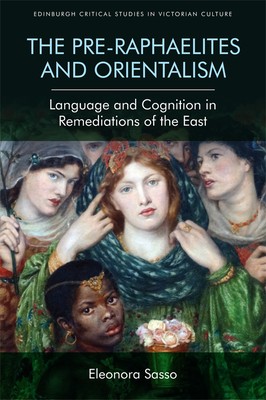
- We will send in 10–14 business days.
- Author: Eleonora Sasso
- Publisher: Edinburgh University Press
- ISBN-10: 1474454860
- ISBN-13: 9781474454865
- Format: 15.2 x 23.1 x 1.5 cm, softcover
- Language: English
- SAVE -10% with code: EXTRA
Reviews
Description
Investigates the latent and manifest traces of the East in Pre-Raphaelite literature and culture
The Pre-Raphaelites and Orientalism: Language and Cognition in Remediations of the East redefines the task of interpreting the East in the late nineteenth century. Weaving together literary, linguistic and cognitive analyses of Pre-Raphaelite paintings, illustrations and writings, socio-cultural investigations of the Orient, and rhetorical considerations about Arabian forms of writing, the terms of critical debate surrounding the East are redefined. It takes as a starting point Edward Said's Orientalism (1978) in order to investigate the latent and manifest traces of the East in Pre-Raphaelite literature and culture. As the book demonstrates, the Pre-Raphaelites and their associates appeared to be the most eligible representatives of a profoundly conservative manifestation of the Orient, of its mystic aura, criminal underworld, and feminine sensuality, or to put it into Arabic terms, of its aja'ib (marvels), mutalibun (treasure-hunters) and hur al-ayn (femmes fatales).
Key Features:
- Looks at how selected examples of Pre-Raphaelite writings acted as major vehicles for raising awareness of cultural diversity
- Redefines the task of interpreting the East in the late nineteenth century taking as a starting point Edward Said's Orientalism (1978)
- By investigating the pervasive influence of The Arabian Nights on Pre-Raphaelite texts, this study aims at bringing together Western and Eastern forms of writing;
- Outlines the reasons why the writings by John Ruskin, D.G. Rossetti, Christina Rossetti, William Morris, Algernon Swinburne, Aubrey Beardsley, and Ford Madox Ford play such a prominent role in the Oriental debate
EXTRA 10 % discount with code: EXTRA
The promotion ends in 11d.17:22:47
The discount code is valid when purchasing from 10 €. Discounts do not stack.
- Author: Eleonora Sasso
- Publisher: Edinburgh University Press
- ISBN-10: 1474454860
- ISBN-13: 9781474454865
- Format: 15.2 x 23.1 x 1.5 cm, softcover
- Language: English English
Investigates the latent and manifest traces of the East in Pre-Raphaelite literature and culture
The Pre-Raphaelites and Orientalism: Language and Cognition in Remediations of the East redefines the task of interpreting the East in the late nineteenth century. Weaving together literary, linguistic and cognitive analyses of Pre-Raphaelite paintings, illustrations and writings, socio-cultural investigations of the Orient, and rhetorical considerations about Arabian forms of writing, the terms of critical debate surrounding the East are redefined. It takes as a starting point Edward Said's Orientalism (1978) in order to investigate the latent and manifest traces of the East in Pre-Raphaelite literature and culture. As the book demonstrates, the Pre-Raphaelites and their associates appeared to be the most eligible representatives of a profoundly conservative manifestation of the Orient, of its mystic aura, criminal underworld, and feminine sensuality, or to put it into Arabic terms, of its aja'ib (marvels), mutalibun (treasure-hunters) and hur al-ayn (femmes fatales).
Key Features:
- Looks at how selected examples of Pre-Raphaelite writings acted as major vehicles for raising awareness of cultural diversity
- Redefines the task of interpreting the East in the late nineteenth century taking as a starting point Edward Said's Orientalism (1978)
- By investigating the pervasive influence of The Arabian Nights on Pre-Raphaelite texts, this study aims at bringing together Western and Eastern forms of writing;
- Outlines the reasons why the writings by John Ruskin, D.G. Rossetti, Christina Rossetti, William Morris, Algernon Swinburne, Aubrey Beardsley, and Ford Madox Ford play such a prominent role in the Oriental debate


Reviews